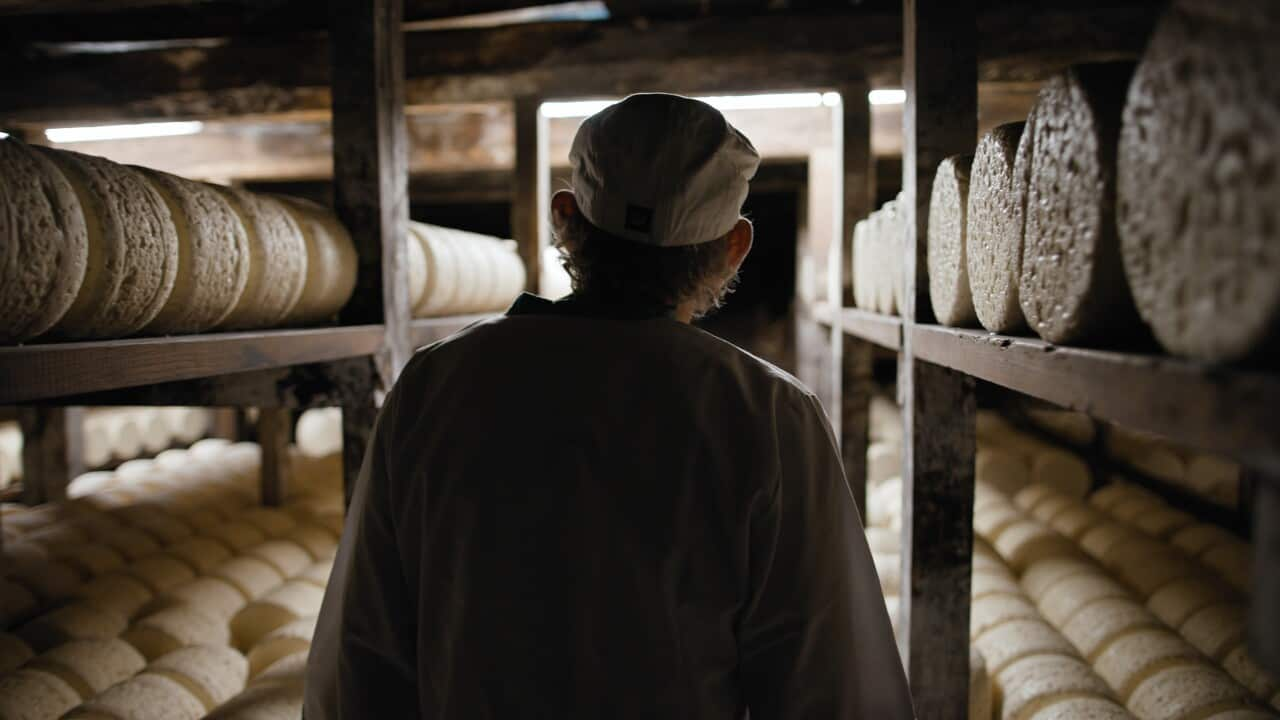Will Studd wants to put artisan cheese back where it belongs: on our tables. “There’s cheese, and then there’s interesting, diverse, specialty cheese," he says.
The veteran cheesemaker and provedore – a bit of a legend in Australian gourmet circles – has dedicated decades to learning about cheese from experts around the world, so if he says we should be eating a certain type of cheese, we are inclined to listen.
Here are some unusual facts about different types of cheese he has uncovered over the years.
You’ve probably never tasted “real” Camembert
Camembert might be a supermarket staple, but most of it is far from the real deal. “Industrial Camembert boring and predictable; it tastes like cardboard with some creamy stuff in the middle,” says Studd.
Camembert de Normandie is the original: raw milk, traditionally made, and protected by PDO status since 1983. It must include at least 50 per cent milk from Normande cows and be made on farms the old-school way.
“Camembert made on the farm, the way it was once made, 200 years ago, has virtually become extinct,” explains Studd, who is passionate about artisan cheese made the traditional way. “But there's been this amazing revival in farmhouse Camembert in the last few years.”
If you’re keen to try it, you’ll have to travel though, as it’s illegal to import raw milk Camembert to Australia.
Several specialty cheeses are banned in Australia
Which brings us to... Strict food laws in countries like Australia and the US make it difficult, sometimes illegal, to buy certain raw milk cheeses. Sardinia’s infamous casu martzu, which contains live maggots, is outright banned.
Another such cheese is Salers Tradition from France’s Massif Central. This rare, raw milk cheese made in traditional wooden barrels (gerles) was almost banned by the French government.

Described as a “cocktail of bacteria, calves’ spit, and raw milk,” it is one of the world’s most microbially diverse cheeses. Thanks to microbiologist Dr Marie-Christine Montel, who proved the cheese’s beneficial microbes outcompete dangerous ones, it avoided a ban.
“Without microbes, there is no life and certainly no great cheese,” says Studd.
Fetta isn’t feta, and haloumi isn’t halloumi
If you’ve wondered why your favourite Mediterranean salty cheeses sometimes bear slightly different spellings – well, it’s not a mistake.
Feta and halloumi are PDO-protected names in Europe. Feta must be made in Greece using sheep’s milk or a mix with goat’s milk, aged in barrels. Halloumi comes from Cyprus, and is made with a mix of sheep and goat’s milk, though it can also contain up to 49 per cent cow’s milk.

In Australia and other countries, “fetta” and “haloumi” are often made with 100 per cent cow’s milk.
“Why buy feta and halloumi made the traditional way?” he says. “Because they taste really good.”
Roquefort almost landed Will Studd in jail
In 1994, Australia banned raw milk cheese imports. Even after some hard cheeses like Parmigiano Reggiano were later allowed, raw blue cheeses like Roquefort remained banned.
So in 2002, Studd imported 80kg of Roquefort to challenge the rule, sparking an 18-month legal battle dubbed The Roquefort Case. Faced with fines up to $100,000 and even jail time, Studd was ordered to re-export or destroy the cheese.
“I popped the cheese into the back of a hearse, drove it very slowly across the Westgate Bridge in Melbourne, to the Brooklyn tip, and buried it as per their command,” says Studd.
The stunt, which appears in his documentary series on SBS, Cheese: Searching for a taste of place, paid off. In 2005, the ban on Roquefort was lifted. Since then, more raw milk cheeses have been approved, but the list remains very short.
Since 2015, Australian cheesemakers have technically been allowed to make hard cheeses with raw milk, but Studd says few do. “The cost of compliance is horrendous,” he explains. “Australian cheese makers are not allowed to make raw milk cheese like their counterparts overseas.”
Timing is everything when it comes to serving and eating cheese
To get the most from your cheese, ideally you should bring it to room temperature before eating – but there is a technique to getting it right. Studd recommends covering cheese with a damp tea towel while it warms.
Take out hard cheeses first, then soft cheeses. Want more character? Eat your cheese closer to its use-by date.
“The closer it gets to the use-by date, the stronger, the more pronounced the flavour and the texture,” explains Studd.

But his best tip? Choose one standout seasonal or farmhouse cheese instead of many average ones.
"It’s important to find a cheese with a genuine taste of place," he says.
SBS Food is a 24/7 foodie channel for all Australians, with a focus on simple, authentic and everyday food inspiration from cultures everywhere. NSW stream only. Read more about SBS Food
Have a story or comment? Contact Us

